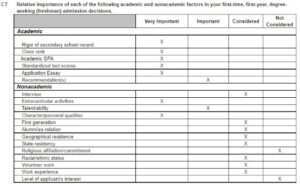The Difference Between Holistic College Admissions and Admissions by the Numbers

One of the most common questions we get from parents and students is what colleges are looking for in an applicant. It depends because colleges are different, and their admissions processes are different.
There are two ways colleges will evaluate an application: through a holistic review or a more straightforward method, which we’ll refer to as admissions by the numbers.
Holistic Admissions
Evaluating a student’s application considers several factors that can’t be conveyed by grades or test scores alone. Below are many, but not all, variables considered in the holistic admissions process or what is sometimes referred to as a comprehensive review.
Grades and Grade Trends
There’s no standard way to review grades. For example, some schools won’t consider freshman-year grades. Some will only consider grades from core classes, and some will recalculate the GPA using their own formula.
A student’s grade trend is also reviewed during this process. There are five grade trends; two are positive, and three that should be avoided.
Positive Grade Trends:
- Consistently high grades
- Grades that reflect an upward trend
Negative Grade Trends:
- Consistently low grades
- Grades that reflect a downward trend
- Rollercoaster grades
Colleges will always favor an upward trajectory of grades or consistently high ones over a trend of lower grades.
Class Rigor
Rigor in your high school classes is one of the most critical factors that will be considered. Showing you’ve taken advantage of the most rigorous courses available is the best way to demonstrate rigor.
Test Scores
Any submitted test scores, including ACT, SAT, and AP subject tests, are considered. However, this is only the case for institutions that accept tests. Most schools, but not all, are currently test-optional.
Essays
The Common Application personal statement is used in reviewing your application, but the college-specific essays and short-answer questions may be more critical to a school’s decision-making process. In addition, these are opportunities for you to share more about yourself that the admissions committee can’t learn from other aspects of your application.
Demonstrated Interest
Many schools will use your interactions with them, in person or virtually, to measure your interest. Several ways to demonstrate interest include: visiting campus, participating in virtual events, requesting an interview, communicating with your regional admissions representative, social media engagement, joining their mailing lists – and then opening those emails.
Letters of Recommendations
Letters of recommendation from teachers allow schools to evaluate your performance in the classroom. Counselor recommendations provide insight into your school and the context in which your application will be reviewed.
Interviews
If a school offers student interviews, it behooves you to schedule one. Usually, school alums will conduct interviews, which are informative versus evaluative. However, if the interview is with an admissions representative, it’s more likely to be an evaluative interview that will carry weight for your application.
Personal Qualities
Demonstrating leadership in your application doesn’t necessarily mean being a class officer or president of a club. You can demonstrate leadership qualities in group projects, part-time jobs, or volunteering opportunities. Other examples are valued character traits like kindness, intellectual curiosity, resilience, integrity, and the ability to get along with a diverse community, to name just a few.
Extracurricular Activities
Colleges are looking at what you do outside of the classroom. These activities can be at school or outside of school and can include formal activities, hobbies, and household responsibilities. They want to see what you’re genuinely interested in and want authenticity and depth vs. breadth.
Hooks
Institutional priorities is another name for “hooks.” Those priorities will differ by school and even by year. They can include diversity and not just racial diversity but gender, geographic, ethnic, or socioeconomic. Priorities can also include athletics, students with unique talents, such as musicians, and legacy students.
Admissions By the Numbers
This method of reviewing applications focuses on three variables: GPA, test scores, and the rigor of your transcript. The actual numbers and metrics of the application are considered rather than the subjective components.
Schools can use one of two variations when reviewing applications with this model.
Mandatory Minimum Model
In this model, a student must meet a minimum test score or GPA, or they will not be admissible. In other words, you won’t be admitted if you have a high test score, but your GPA doesn’t meet the minimum standard.
Freshman Index Model or Eligibility Index
This model allows for more flexibility. The higher either the GPA or test score is, the other variable can be lower. Students with a high GPA but a lower-than-expected test score may still be admissible.
How To Know How a School Evaluates an Application?
You can find this information on the website or by asking your regional admissions representative. There are also online resources available that can help you determine what specific application criteria are considered for each school.
Big Future is run by the College Board (which also produces the SAT). Application requirements and ranges for GPA and test scores are available.
College Data includes the required or recommended high school subject units the college is looking for applicants to have completed.
Common Data Sets are a standardized display of information provided directly by the institution. You can usually find these on the school’s website under their institutional research section.
Below is an example of the information from Vanderbilt University’s Common Data Set that shows what factors they will consider in admission decisions.

Pro Tips
- Institutions that practice holistic admissions will review your application in the context of your high school. So, for example, if your school doesn’t offer AP classes, then not having them on your transcript doesn’t affect your application.
- Although some schools don’t require standardized test scores for the application, they may need them for institutional scholarships. Do your research on all scholarship requirements and deadlines.
- Admission by the numbers vs. holistic admissions is similar to how colleges award scholarships. Some grant them based on grades or test scores, whereas others use many criteria discussed above to determine to whom to give their money.
- Requirements can change, so review the most recent data available regardless of where you do your research. If you have any doubts, contact the school’s admission office.





